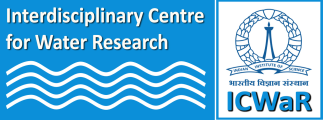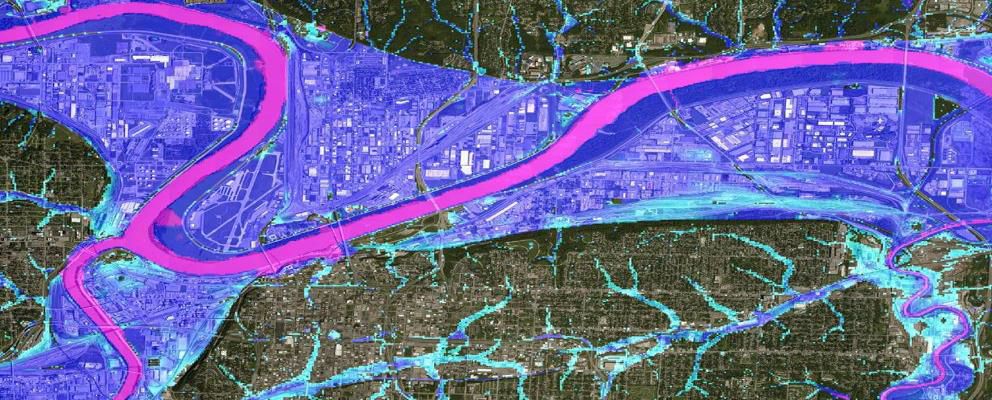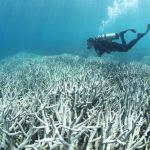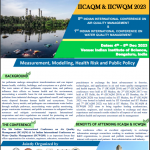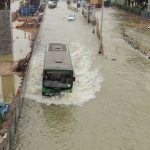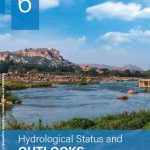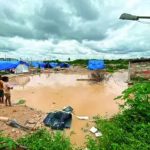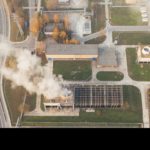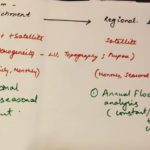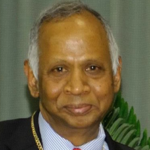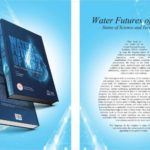ICWAR Seminar Series
|
29 Jul
2022
|
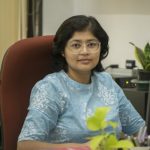
Name of the Speaker: Dr. Arpita Mondal Title of the Seminar: What (NOT) to do as an early career academic and researcher in India [Gallery] Date and Time: 29 July 2022 (Friday), 4:00pm Online Platform: MS Teams (link to the video of the seminar) About the Speaker: Dr. Arpita Mondal works as an Associate Professor in the Department of Civil Engineering and Interdisciplinary Program in Climate Studies at the Indian Institute of Technology (IIT) Bombay. Her research focuses on hydroclimatic extremes – how they can be characterized, what causes them, and how they are likely to evolve with climate change. Arpita serves as an Associate Editor of the AGU journal Earth’s Future and the Springer journal Regional Environmental Change. She received the Early Career Research Award from the Science and Education Research Board (SERB), and the INSPIRE Faculty Award. She also received the Asian University Alliance (AUA) Scholars’ Award. Arpita has been selected to feature in the book ‘She Is: 75 Indian Women in STEAM’ by the Office of the Principal Scientific Advisor to the Government of India and the Red Dot Foundation, honoring 75 Indian Women in the fields of Science, Technology, Engineering, Arts and Mathematics. She has been an invited speaker in the session on Women in STEM in the South Asia Leadership Summit of the British Council, India. Arpita completed her PhD in Civil Engineering at the Indian Institute of Science (IISc), Bangalore, MTech in Water Resources Engineering at the Indian Institute of Technology Bombay and Bachelors in Civil Engineering at Jadavpur University, Kolkata. As a PhD student, Arpita had received the Endeavour Research Fellowship of the Government of Australia, the Fulbright-Nehru Research Fellowship of the United-States India Education Forum, and the Berkner Travel Grant of the American Geophysical Union (AGU). Abstract: ‘How to become a professor in an Indian Institute of Technology (IIT)?’ is a question which is asked by several in our country. There is an increasingly large number of awareness and mentoring programs conducted by organizations and academies in this country to address this query among the public in general, and graduate students in particular. Another equally important question to which answers must be sought is, ‘How to survive as an early career academic or researcher in today’s India?’. Many Indian academic or research institutions offer to young professionals what are termed as ‘permanent’ jobs; however, stagnation, dearth of progress and lack of navigation along multiple directions of growth (both one’s own individual growth and that of his/her employer) can prove fatal for one’s career and more importantly, personal well-being, if adequate, timely steps are not taken to make sure one is not only ‘surviving’ but also ‘thriving’, particularly compared to global benchmarks. In this seminar, I will talk about key responsibilities expected out of an early career academic in a leading engineering institute in India, highlight some opportunities and challenges towards a bright and successful academic/research career and also offer suggestions to avoid some mistakes (I think) I did. I will share some stories, and advice that I had been lucky to receive, and hopefully hear back from the audience about what drives them towards their own pursuit of excellence. Women graduate students and early career researchers are expected to particularly benefit from this talk, since I will also share some experiences and suggestions on overcoming gender-defined obstructions. |
|
30 Jun
2022
|

Name of the Speaker: Prof. Alexandre Anesio Title of the Seminar: How microbes melt glaciers and ice sheets? Date and Time: 30 June 2022 (Thursday), 4:00pm Online Platform: MS Teams (link to the video of the seminar) About the Speaker: Alexandre Anesio is a Professor in Arctic Microbiology in the Department of Environmental Science at Aarhus University. His main research interest is on microbial and biogeochemical processes in glaciers and ice sheets. He is currently one of the PIs in a European Research Council Synergy grant to investigate how pigmented algae, growing directly on the snow and bare ice, through their photophysiology, have a crucial role in changing the reflectivity of the ice (i.e., albedo), and subsequently the melt rates of the ice. Anesio obtained his PhD degree at Lund University in Sweden in 2000, where he also worked as postdoc until 2003. Since then, he has worked at the University of Nottingham (2003-2004), Aberystwyth University (2004-2007) and University of Bristol (2007-2018), until moving to Denmark in 2018. Abstract: Glaciers and ice sheets were long believed to be sterile environments, but just like other large ecosystems (e.g., tropical forests, tundra), they are now widely recognized as one of the Earth’s biomes, teeming with life. This biome is also the most under-investigated on the planet from a biological and biogeochemical perspective, representing a new and exciting frontier in science. Home to large, naturally occurring communities of mostly microbes, glaciers and ice sheets host metabolically active organisms, interacting with each other. These processes represent more than just a minor curiosity of life under extreme conditions. On glacier and ice sheet surfaces, microbes have been shown to alter physical and chemical characteristics of snow and ice with direct consequences for snow/ice solar-heating and amplified melt. During the summer ablation, the bare ice is largely dark, as it is colonized by pigmented ice algae. Biological growth of icebound algal cells can accumulate biomass high enough to cause albedo reduction between 12% and 21%, depending on the algal cell abundances. The impact of microbially-mediated albedo effect is predicted to increase further with climate change, since a warming climate will further extend melt seasons. Furthermore, microbial activity and carbon fixation on ice surfaces can result in export of labile dissolved organic matter to downstream ecosystems. |
|
31 May
2022
|

Name of the Speaker: Prof. Dev Niyogi Title of the Seminar: Representing Cities in Weather and Climate Models: From Processes to Urban Digital Twins Date and Time: 31 May 2022 (Tuesday), 4:00pm Online Platform: MS Teams (link to the video of the seminar) About the Speaker: Dr. DEV NIYOGI, is John E. “Brick” Elliot Centennial Endowed Professor at the University of Texas at Austin, in the Jackson School of Geosciences, and the Department of Civil, Architectural and Environmental Engineering. He is a graduate faculty of the Oden Institute of Computational Engineering and Science, and University of Texas Center for Space Research. He is also Professor Emeritus, Purdue University, Department of Agronomy and Department of Earth, Atmospheric, and Planetary Sciences, and former Indiana State Climatologist (2005- 2018). He is an Editor for the AMS Journal of Applied Meteorology and Climatology. Linkdn: https://www.linkedin.com/in/texus/ Prof. Niyogi’s research seeks to significantly contribute to our understanding of the Earth system, particularly the urban and agricultural landscapes, and the dynamic role of coupled land surface processes on weather and regional meteorological extremes. An important ongoing and emerging focus of his research is to translate the scientific work undertaken into decision tools and portals with a particular focus on hydroclimatology and sustainable climate-ready/resilient cities. Abstract: Urbanization is a global phenomenon and a notable feature of anthropogenic impacts. Cities have a relatively small spatial footprint, but likely have a much larger and discernable impact on the regional weather, and hydroclimatic processes. This presentation is aimed as a primer to highlight what the science community has understood about the effects of cities and urban clusters on local to larger scale meteorological processes. The talk will draw on multiscale evidence from different studies to highlight the need for representing urban processes within weather and climate studies. The talk will also discuss different approaches underway in the traditional modeling sense involving physics-based framework, and the recent opportunities using AI/ML approaches culminating in the efforts underway for developing an urban digital twin. |
|
28 Apr
2022
|

Name of the Speaker: Prof. Abhijit Mukherjee Title of the Seminar: Interaction of groundwater with surface water: the example of Ganges river Date and Time: 28 April 2022 (Thursday), 4:00pm Online Platform: MS Teams [link to the video of the seminar] About the Speaker: Prof. Abhijit Mukherjee, PhD (Hydrogeology) graduated from the University of Kentucky, USA (2006) and completed postdoctoral work at the University of Texas at Austin, USA (2006-2008). He served as the Physical Hydrogeologist at the Alberta Geological Survey in Canada (2008-2010). He is currently an Associate Professor at the Department of Geology and Geophysics, and School of Environmental Science and Engineering at the Indian Institute of Technology Kharagpur (IIT Kharagpur), India. His main research areas are physical, chemical and isotope hydrogeology, including numerical modeling, computation, contaminant transport, water policy applications. He is known for his studies on geological and human-sourced groundwater pollution (e.g. arsenic, fluoride, sanitation-borne and emerging contaminants) in more than a dozen countries, water quantity estimates including application of advanced computation and Artificial Intelligence techniques. For his work on groundwater Prof. Mukherjee has been conferred the National Geoscience Award 2014 by the President of India, Kharaka Award in 2020 by International Association of Geochemist, inducted as Fellow to Royal Society of Chemistry (2020) and the Geological Society of America (2021), named as top 75 leading Scientists and Experts who are under 50 years of age. As the first South Asian, ever, he is presently serving in the Council of the Geological Society of America. He was awarded the Shanti Swarup Bhatnagar Prize in 2020, regarded as India’s highest science award. Abstract: The mega-Himalayan river Ganges (or Ganga), one of the largest in the world and the lifeline of northern India for the last several thousand years, hosting almost 10% of the present global and half of Indian population on its fertile banks, has been found to have unprecedented low levels of river water (drying up) in several lower reaches in the summers of recent years. Using a combination of satellite-based and in-situ measurements of river water and groundwater levels, isotopic and chemical analyses of Ganges river and groundwater, simulation results from global hydrologic models and regional groundwater flow models, shows that the present-day summer drying of the river Ganges is possibly driven by groundwater depletion in the Gangetic aquifers of north India. One hypothesis is that a decrease in groundwater inflow (baseflow) has a severe impact on the health of the river. The present-day baseflow to the Ganges from the adjoining aquifers, which may be up to a third of total river volume during pre-monsoon months, might have decreased by >50% from the beginning of irrigation-pumping age in the 1970s. Under several assumptions and approximations, it has been predicted that the groundwater contribution to Ganges river water flow would continue to decrease in impending years, and can decrease up to ~75% of the 1970s. Thus, a continuation of the groundwater exploitation at similar per-capita rates might jeopardize the existence of the Ganges River in several reaches in near future, thereby leading to disastrous carbohydrate and other food scarcity for ~ 115 million people inhabiting in the study region by 2050. |
|
28 Mar
2022
|

Name of the Speaker: Dr. Aditi Mukherji Title of the Seminar: Major findings from IPCC Water Chapter on Water Related Adaptations and their Effectiveness in reducing risks Date and Time: 28 March 2022 (Monday), 4:00pm Online Platform: MS Teams [link to the video of the seminar] About the Speaker: Dr. Aditi Mukherji is a Principal Researcher and leads the Research Group on Climate Change Adaptation and Resilience (CCAR) at the International Water Management Institute. Before this, she led the Water and Air Theme at the International Centre for Integrated Mountain Development (ICIMOD) in Nepal. She has over 20 years of experience working on policies and institutions of water resources management with a special focus on water-energy-food nexus. Her areas of specialization are groundwater governance, energy-irrigation nexus, climate change adaptation and community management of water resources. She has worked in South Asia including the Hindu Kush Himalayan region, Nile basin and in Central Asia. She is currently a part of the 6th Assessment Report (AR6) team of the Intergovernmental Panel on Climate Change (IPCC) and is the Coordinating Lead Author (CLA) of the Water Chapter in the Working Group II on Adaptation and Vulnerability and a member of Core Writing Team for the IPCC’s AR6 Synthesis Report. Aditi is a human geographer by training and has a PhD from Cambridge University, United Kingdom. Abstract: IPCC Working Group II formally launched its report on Impacts, Adaptation and Vulnerability on 28th of February, 2022. The writing of this report involved over 270 scientists who spent last 3 years going through literature and assessing the impact of climate change on human and natural systems, and role of adaptation in alleviating some of these impacts. Water chapter is one among 18 chapters in this report. This chapter reiterates findings from WGI report about intensification of water cycle, and shows how every sector of the economy (agriculture, energy, urban etc.) and ecosystems have been affected by this climate induced intensification of water cycle. Majority of world’s population, especially those involved in climate sensitive occupations like agriculture are feeling impacts of climate change through changes in the water cycle, such as through extreme precipitation, melting of glaciers, floods and droughts. The chapter also finds that water is also a part of solution. A large majority of the adaptation options are in response to water related hazards, or adaptation response itself is water related, e.g., irrigation, soil moisture conservation, water storage, rainwater harvesting etc. Many of these water adaptation responses have several benefits, including instances of climate risk reduction. However, effectiveness of these adaptation measures in reducing climate risks goes down substantially at higher levels of global warming, thereby emphasizing the importance of mitigation along with adaptation. |
|
02 Mar
2022
|

Name of the Speaker: Prof. Paul D Bates Title of the Seminar: Progress in developing continental and global scale flood inundation models Date and Time: 02 March 2022 (Wednesday), 4:00pm Online Platform: MS Teams [link to the video of the seminar] About the Speaker: Paul Bates FRS is Professor of Hydrology at the University of Bristol, UK and Chairman of Fathom (www.fathom.global). He is one of the world’s leading experts in the modelling of flood inundation with widespread research interests in risk, resilience, uncertainty, governance and decision making in relation to natural hazards and global water issues. His main area of study is to develop new numerical solutions to the Shallow Water equations and combines these with satellite and airborne data to advance our fundamental understanding of flood dynamics and reduce threats to life and economic losses worldwide. Previously, he was Director of the Cabot Institute and Head of the School of Geographical Sciences at Bristol and has spent sabbatical periods at Laboratoire National d’Hydraulique et Environnment in Paris, the EU Joint Research Centre, Princeton University and the NASA Jet Propulsion Lab at CALTECH. He has published over 240 papers in International peer reviewed journals and has an ISI H-Index of 80 and a Google Scholar H-Index of 100. He is a lifetime Fellow of the Royal Society of London and the American Geophysical Union, a Royal Society Wolfson Research Award holder and in 2019 was awarded a CBE by Queen Elizabeth II for services to flood risk management. Through his work with insurers, charities and NGOs the data sets created using methods developed by his team are used to reduce risks to life and economic losses for hundreds of millions of people globally. Abstract: Flooding is one of the most costly natural disasters and every year affects tens of millions of people and causes billions of dollars in losses, and the most damaging events have affect very large areas. Despite this, the reality is that all flood impacts are felt locally and occur at the level of individual properties. The ultimate challenge in flood modelling therefore is how to provide detailed and skilful hazard and risk predictions at the scale of individual buildings over whole continents or even the whole globe. This talk describes recent efforts at the University of Bristol in the UK to build a two dimensional hydrodynamic model at 90m resolution covering the entire planet and 30m over the parts of the US, Europe and the UK, both for current conditions and future climates. The talk describes the technical challenges and also detailed validation studies which demonstrate the strengths and weaknesses of this type of model. Here is a nice image to go with the talk.
|
|
24 Jan
2022
|
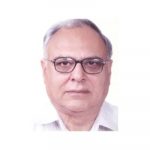
Name of the Speaker: Prof. S.K. Tandon Title of the Seminar: The Anthropocene Concept: Disturbance(s) in the Terrestrial Hydrosphere Date and Time: 24 Jan 2022 (Monday), 4:00pm Online Platform: MS Teams [link to the video of the seminar] About the Speaker: Prof. S.K. Tandon is an eminent geoscientist and academician who has been associated with several institutions of higher learning of our country. After an early stint at the Wadia Institute of Himalayan Geology from 1971 to 1976, he taught at the University of Delhi for 34 years until his retirement from there in 2010. Later, he was involved in teaching/research and mentoring at the Earth and Environmental Sciences departments of the IIT Kanpur (2013-2015), IISER Bhopal (2016-2022) and IISER Mohali (2017). Prof. Tandon has broad research interests in the field of geodynamic evolution of India and has contributed significantly to the understanding of several Phanerozoic stratigraphic records of the country, including the Late Quaternary sequences of the Ganga Plains and the Thar desert of Rajasthan. His lasting interest is in the understanding of Earth Surface Processes- both in modern and ancient continental sedimentary systems; it is this interest in Earth Surface Processes that has attracted him to the subject of Anthropocene. Prof. Tandon has authored over 150 research papers and has co-edited both books and journal special issues/volumes. He is a Fellow of all the three science academies in India, besides being a Fellow of the Third World Academy of Sciences. He has served the Research Councils and the Governing Bodies of most of the Earth Sciences institutes of the country, and has chaired several of the Earth Science Committees of the DST, SERB, CSIR, besides having been the Pro-Vice Chancellor of the University of Delhi from 2005 to 2010. Abstract: The term Anthropocene, little known two decades ago, was introduced by Crutzen and Stoermer in 2000 and is now in common usage in the discourse of different science disciplines, particularly in the Earth, Environmental and Life Sciences. Further, it has also been adopted in art and cinema, humanities, social sciences, and policy and governance amongst others. The essence of the concept is well articulated in the title of an article published in 2008 by three leading authorities (Steffen, Crutzen, and McNeill): ‘The Anthropocene: Are humans now overwhelming the great forces of nature?’ Notwithstanding debates around the meaning and definition of the term, as well as the placement of the lower boundary of the Anthropocene, the informal usage of the term stands firmly entrenched across several domains of knowledge. Additionally, the concept of a human-dominated planet is closely linked to the ideas of tipping points, planetary boundaries, and the exploration of safe operating space(s) for humanity, that have been quite effectively championed in the last decade by Rockstrom and his collaborators. Of the nine planetary boundaries advanced by these authors in an influential article published in Ecology and Society in 2009, the water boundary along with the attendant water cycle modifications /water resilience are issues of strong concern, and are therefore being elaborated currently. In this talk, I shall discuss the development of these concepts in addition to presenting a few examples from India’s disturbed river systems. |
|
27 Dec
2021
|

Name of the Speaker: Prof. Kala Seetharam Sridhar Title of the Seminar: Are Cities Culprits or Victims? India’s Carbon Footprint Beyond 2020 Date and Time: 27 Dec 2021 (Monday), 4:00pm Online Platform: MS Teams [link to the video of the seminar] About the Speaker: Kala S Sridhar, Ph D is Professor, Centre for Research in Urban Affairs at the Institute for Social and Economic Change (ISEC), prior to which she was Ford Public Affairs Fellow at Public Affairs Centre, Fellow at the National Institute of Public Finance and Policy and taught at the Indian Institute of Management Lucknow as Assistant and Associate Professor. She has authored or edited several books published by Routledge, Oxford University Press, Palgrave Macmillan, Springer, and Sage, and has published papers in journals which include Regional Science and Urban Economics, Urban Studies, Applied Economics, among others. She is a Fulbright Nehru fellow during 2021-22, hosted by the University of California Los Angeles. She has a Ph.D. from the Ohio State University and M.S. from the University of Iowa. She is a regular contributor of columns to India’s financial dailies such as Economic Times. She has won several international awards for her research on urbanization including the highly competitive Global Development Network medal for outstanding research on development, two times. She was empanelled to be Indian Council for Cultural Relations (ICCR), Chair Professor of Indian Studies (Economics) in Foreign Universities 2015. She is consistently among the top 10% of authors globally on the Social Science Research Network. She has been a member of expert committees on urban development for the Government of Karnataka, and has done extensive research for the Asian Development Bank (ADB). She was member of the Scientific Committee of the 2016 Urban Transitions Conference, co-hosted by Yale University and Elsevier, which was held in Shanghai, People’s Republic of China. She is a referee for many international journals including Urban Studies, Cities, Housing Policy Debate, Environment and Urbanization Asia, among several others. She is on the editorial advisory board of journals such as Area Development and Policy (Taylor Francis), Urban India (published by India’s National Institute of Urban Affairs), and Frontiers in Built Environment Urban Science. Abstract: While the Global North and South were very different in terms of their trajectory of economic growth some years ago, now they are increasingly convergent on economic growth as well as their environmental sustainability. It is now also well known that cities are the engines of economic growth in developing countries of the Global South. However, much as they are the engines of the economy, cities are also blamed for carbon emissions due to a number of factors. But cities are also victims of carbon emissions and climate change due to the density of population and economic activity. Reference |
|
30 Nov
2021
|
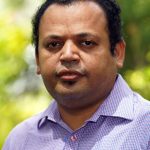
Name of the Speaker: Dr. Lakshminarayana Rao Title of the Seminar: Wastewater Treatment and Recycling – Challenges and Opportunities Date and Time: 30 Nov 2021 (Thursday), 4:00pm Online Platform: MS Teams [link to the video of the seminar] About the Speaker: Dr. Lakshminarayana Rao is a chemical engineer by training, has a PhD from McGill University, Montreal Canada and is currently working as a assistant professor at Centre for Sustainable Technologies, at IISc, Bangalore India. Prior to joining IISc, Dr. Rao has worked in Industry for 10 years. His research interests are in the field of cold plasma technology, and advanced oxidation for wastewater treatment and recycling. To date Dr. Rao has authored over 60 international journal articles and conference papers and has six granted US patents in the field of plasma technology and its application. Abstract: Using freshwater for toilet flushing is a luxury humans cannot afford anymore. With increasing population, climate change and expanding pressures on water resources, much of the world faces a major water crisis. Globally, water shortages are estimated to affect more than 4 billion people annually. India occupies only 2.4 % of the world’s total land area yet supports over 17.5 % of the global population. The total freshwater resource of the country is only 4% of the world’s total utilizable water resource, which is disproportionately low for the current population. In India, over 600 million people face high to extreme water scarcity, with water contamination estimated to impact as much as 70 % of the country’s utilizable water resource. Rural areas face the twin challenges of water scarcity and risk of groundwater contamination due to lack of water treatment options. In this presentation, I will discuss about the design and field implantation of decentralized wastewater treatment system for a rural community. The challenges and opportunities at operating such stand-alone system will be discussed. Also, in this task I will present how cities can become a perennial source of treated water for neighbouring villages. The challenges, opportunities and threats of a large scale (440 MLD) treated water recycling scheme will be discussed. |
|
28 Oct
2021
|
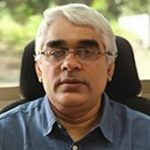
Name of the Speaker: Prof.Krishnan Raghavan Title of the Seminar: Global Climate Change and Impacts on Monsoon Hydrological Cycle Date and Time: 28 Oct 2021 (Thursday), 4:00pm Online Platform: MS Teams [link to the video of the seminar] About the Speaker: Dr. Krishnan Raghavan specializes in climate modeling studies on scientific issues relating to “Climate Change, Asian Monsoon and Water Cycle”. Currently he heads the Centre for Climate Change Research (CCCR) at IITM, Pune and is engaged in developing in house capability in Earth System Modeling to address the science of climate change. Under his leadership the CCCR developed the IITM Earth System Model (ESM) – the first global climate model from India that contributed to the CMIP 6 and IPCC Sixth Assessment Report. He is a coordinating lead author in the IPCC AR 6 WG 1 report (Chapter 8 Water Cycle Changes) and a drafting author in the Summary for Policymakers. He and his team from CCCR IITM published the First National Climate Change Assessment Report of the Ministry of Earth Sciences, Govt of India in 2020. After obtaining a M.Sc degree in Applied Mathematics from the Madras Institute of Technology, Chennai, he pursued Ph.D research in Atmospheric Sciences at the Physical Research Laboratory, Ahmedabad. He was awarded Ph.D degree from the Univ of Pune in 1994. He has published over 140 scientific articles/papers, supervised/co supervised 12 Ph D degrees 11 ongoing) 7 Master (M.Sc/M.Tech) dissertations. He offered training lectures in Geophysical Fluid Dynamics Atmospheric Sciences Abstract: Human induced climate change has warmed the atmosphere, ocean, and land, and is already affecting ever region of Earth in multiple ways. The changes we experience will increase with further warming. This talk will provide a brief summary of the key assessments from the IPCC AR 6 WG 1 report, with special focus on observed and projected changes in water cycle, the regional monsoons, attribution of regional monsoon precipitation changes to different anthropogenic drivers (eg. GHG, aerosols, ..) uncertainties in water cycle projections and related topics. |
|
21 Sep
2021
|
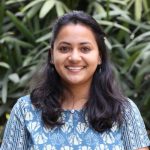
Name of the Speaker: Dr. Chandni Singh Title of the Seminar: Assessing the feasibility of climate change adaptation options in the water sector: Examples from rural and urban landscapes Date and Time: 21 Sept 2021 (Tuesday), 4:00pm Online Platform: MS Teams [link to the video of the seminar] About the Speaker: Dr Chandni Singh is a Senior Researcher and faculty member at the Indian Institute for Human Settlements (IIHS), Bangalore. Her research examines the drivers of differential vulnerability to climate change and hazards; linkages between climate change adaptation, livelihoods, and development; how and why people adapt (or choose not to); and the outcomes of these decisions on wellbeing and aspirations. She currently co-leads projects on urban sustainability and green infrastructure (https://upagri.net/), long-term disaster recovery (https://recoverywithdignity.iihs.co.in/), and climate-resilient development. In the past, she has worked in international and national organisations on community-based watershed management, wetland restoration, livelihoods strengthening. She is a Lead Author on the IPCC Assessment Report 6 Working Group II (Impacts, Vulnerability, and Adaptation); Contributing Author on the IPCC’s Special Report on 1.5 C; and Lead Author on the Third Assessment Report on Climate Change and Cities (ARC3.3). She serves on the Editorial Boards of Regional Environmental Change, Climate and Development, Progress in Development Studies, and Urbanisation. Chandni holds a PhD in Rural Livelihoods from the University of Reading, UK and an MSc in Environmental Science from TERI University, New Delhi. Abstract: Water availability mediates rural and urban development through its impacts on a range of sectors such as agriculture and industry. Climate change and associated risks attenuate this water availability. Given this, various adaptation options have been implemented in the water sector. These are interventions targeting demand management or supply augmentation; focussing on improving water use efficiency etc. However, which adaptation options are feasible in particular contexts and how should one prioritise interventions? To answer this question (and inform adaptation prioritisation), it is critical to assess the various adaptation options in the water sector and synthesise lessons on which options are feasible and under what conditions. This talk will outline how the multidimensional feasibility of adaptation options in the water sector can be assessed. It will then showcase how adaptation feasibility is regionally differentiated, two case studies are discussed: flood management in cities; and community-based watershed management in rural areas. The approach also links climate adaptation aims with other concurrent issues facing water managers – that of synergies and trade-offs with climate mitigation and sustainable development. Water has been called the “middle child of global climate policy” (https://www.nature.com/articles/s41558-021-01154-y), this talk will outline one way to think of addressing this and highlight how the water sector already has a suite of adaptation choices to draw on. Dr Amir Bazaz, Senior Lead (Practice) at IIHS will join as a discussant |
|
23 Aug
2021
|

Name of the Speaker: Prof. Raghu Murtugudde Title of the Seminar: Building an Early Warning System for Waterborne Diseases in India Date and Time: 23 Aug 2021 (Monday), 4:00pm Online Platform: MS Teams [link to the video of the seminar] About the Speaker: Raghu Murtugudde did a B Tech in Aeronautical Engineering from IITB and a PhD in Mechanical Engineering from Columbia University. He worked as a Research Scientist at NASA GSFC before becoming a faculty in Atmospheric and Oceanic Science and Earth System Science at the University of Maryland. He has been a visiting faculty at various Indian institutions, most recently at IITB. His interests include earth system science and regional earth system predictions for food, water, and health. As an Earth System Scientist, Raghu studies the interactions between the physical world and life and explore the co evolution of life and climate and what it means for sustainability. Data analysis, Regional Earth System Modeling and Predictions are combined to advance process and predictive understanding of the Earth System, especially at regional scales. His hypothesis is that all global warming is local and the impacts are manifest in the food, water, energy and health nexus. Producing region specific predictive information at daily to seasonal timescale that is useful and usable and what if scenarios for years to decades are his main interests. His personal interest also includes agroforestry as a sustainable agriculture and watershed management approach and its ability to sequester additional carbon in soils while enhancing drought resilience and soil moisture persistence. Abstract: India has made tremendous progress in the process and predictive understandings of monsoon variability, change and extremes. The extensive investments in predictions systems have paid off with increasing skills at short, medium, and extended ranges as well as at seasonal to interannual timescales and future a projections of monsoons. Applications of the forecasts, especially at the sub seasonal to seasonal (S 2 S) forecasts are growing. Unfortunately, the warm temperatures and the monsoons also favour explosion of pathogens and their ingestion by humans India remains a hotspot for diseases. Time is ripe for early warning systems for waterborne diseases at the S 2 S timescale to build a Ready Set Go system to manage health outcomes and reduce disease morbidity, mortality and productivity losses. The high spatial variability of the monsoon rains and extremes and their relation to external drivers such as El Niño are explored in the context of Enteric Fever cases in Surat and Ahmedabad. Some ways forward on mapping and synthesising water quality and health data across India and building health early warning systems are discussed |
|
27 Jul
2021
|

Name of the Speaker: Prof. Dan Obenour Title of the Seminar: Long-term Data and Bayesian Inference Elucidate Controls on Surface Water Quality Date and Time: 27 July 2021 (Tuesday), 4:30pm Online Platform: MS Teams [link to the video of the seminar] About the Speaker: Dan Obenour is an Associate Professor in the Department of Civil, Construction, and Environmental Engineering at North Carolina State University. He is also a Faculty Fellow at the University’s Center for Geospatial Analytics. He received his PhD from the University of Michigan in 2013, and he completed a postdoc based at the NOAA Great Lakes Environmental Research Laboratory in 2014. He also has several years of experience in environmental and water resources consulting. Dan’s research focuses on the development and application of probabilistic models for predicting water-quality outcomes in aquatic systems under varying management and climate scenarios. His models have been used in annual forecasts of harmful algal blooms and hypoxia in Lake Erie, the northern Gulf of Mexico, and the Neuse River Estuary. His research also encompasses data-driven pollutant fate and transport modeling in regional watersheds. He serves on multiple advisory boards, including the Albemarle Pamlico National Estuary Partnership (APNEP) Science and Technical Advisory Committee. Abstract: The water quality of freshwater and coastal systems is constantly changing due to varying anthropological and climatological inputs. However, our ability to manage and predict water quality is often limited by sparse monitoring data and an incomplete understanding of the relevant biogeochemical processes. This presentation will highlight recent research synthesizing long-term datasets, process-based models, and statistical (i.e., Bayesian) inference to enhance our understanding of water-quality dynamics. These data-driven models systematically update prior knowledge of key biophysical rates while providing rigorous uncertainty quantification. Case studies include algal blooms in Lake Erie, hypoxia in the northern Gulf of Mexico, and nutrient dynamics in southeastern U.S. watersheds and reservoirs. Model applications for seasonal and scenario-based water-quality forecasting will also be shown. In particular, the sensitivity of water-quality outcomes to changes in watershed development, nutrient loading, and climate is explored. Finally, challenges and research opportunities for advancing these data-driven, water-quality modeling approaches are highlighted. |
|
24 Jun
2021
|

Name of the Speaker: Dr. Albert Ruhi Title of the Seminar: Hydroecology in a rapidly changing world Date and Time: 24 June 2021 (Thursday), 6:00pm Online Platform: MS Teams [link to the video of the seminar] About the Speaker: Albert Ruhi is a freshwater ecologist and Assistant Professor at the University of California, Berkeley (Dept. Environmental Science, Policy, and Management). His group develops experiments and large-scale data analysis to advance current understanding of the ecology and conservation of freshwater ecosystems, focusing on how native and non-native biodiversity in river networks responds to global change stressors such as hydrologic extremes and drought. Prof. Ruhi received a B.Sc. in Biology and a Ph.D. in Ecology from the University of Girona (Catalonia), and has conducted most of his research in water-scarce regions of the world–namely the Mediterranean basin and the American Southwest. Before joining UC Berkeley, he was a postdoctoral researcher at Arizona State University, and a Fellow at the National Socio-Environmental Synthesis Center (SESYNC) in Maryland, where he studied impacts of flow alteration by U.S. dams via large data sets and time series methods in the frequency and time domains. Prof. Ruhi has published more than 50 papers, is an Associate Editor for the journal Conservation Letters, and has received numerous awards recognizing his research, such as a U.S. National Science Foundation CAREER award, a California Sea Grant New Faculty Award, a Hellman Fellow Award, and University of Girona’s Extraordinary Doctoral Degree Award in Environmental Sciences (for his Ph.D. work). In Spring 2021 he also received a UC Berkeley teaching award (“Extraordinary Teaching in Extraordinary Times”) for an undergraduate course on time series analysis applied to ecological and environmental data. Abstract: Prof Ruhi’s seminar will review the different ways in which humans and climate change are altering river flows, and the challenge of studying hydro-ecology when both hydrological and ecological baselines are shifting. He will show examples of flow regime alteration driving native to non-native fish covariation at different spatial scales in the United States, and the mechanisms underpinning such ecological responses. He will also delve into alteration of flow periodicity induced by hydropower dams (“hydropeaking”), and how changes in the time scales of flow variation promote or hinder particular organismal traits. He will conclude by showing recent work developed by his lab, aimed at understanding the mechanisms by which climate-change induced early snowmelt (and extended low flows), and flow intermittency, affect river ecosystem dynamics, based on field experiments in coastal and Sierra Nevada streams in California. |
|
21 May
2021
|
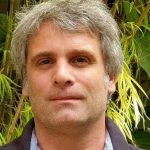
Name of the Speaker: Dr.Fabrice Papa Title of the Seminar: The variability of water storage and fluxes over large tropical river basins from multi-satellite observations and their impacts on the land-ocean continuum Date and Time: 21 May 2021 (Friday), 5:00pm Online Platform: MS Teams [link to the video of the seminar] About the Speaker: Dr Fabrice Papa is a research Director at the Institut de Recherche pour le Développement (IRD-LEGOS, France) and has focused his research on satellite remote sensing of the Earth and its application to study the global water cycle. His main interests are the use of multi-satellite observations to understand continental hydrology and its interactions with the ocean, climate variability and global changes, particularly in tropical regions. He is a member of the Science Team (ST) of the NASA-CNES satellite Surface Water and Ocean Topography (SWOT) and co-leads the SWOT Working Group on River Science. After receiving his PhD from the University of Toulouse, France in 2003, he was employed at the NASA-GISS laboratory at Columbia University, NY, USA until 2010, when he joined IRD. From 2012 to 2017, he was on deputation at the IRD-IISc Joint International Laboratory in Bangalore, India. He is currently on IRD deputation at the University of Brasilia in Brazil. https://publons.com/researcher/1742104/fabrice-papa/publications/ Abstract: Terrestrial waters, despite being less than 1 % of the total amount of water on Earth’s ice-free land are essential for life and human environment. They play a primary role in the global water and carbon cycles, with significant impacts on climate variability. A better characterization of their distribution and dynamic over the whole globe is therefore of highest priority, including for the management of water resources. However, despite their importance, basic questions are still opened such as: what are the spatio-temporal variations of the fluxes and storages of continental freshwater across scales and how do they interact with climate and the anthropogenic pressure? Those questions are specifically important for the Tropics which are now facing growing demands for freshwater availability. Firstly, using multi-satellite observation techniques, we will quantify the global variations of monthly surface water extent (at 25km spatial resolution) over ~25 years (1992-2015) and assess their recent changes both in terms of climate variability and anthropogenic pressure. For large river such as the Amazon, the Ganges-Brahmaputra (G-B) or the Congo, we further combined our surface water extent estimates with hundreds of radar altimeter-derived water level time-series and DEM data to derive the spatio-temporal variability of surface freshwater storage (SWS). Over the Amazon for instance, we show that the annual amplitude of SWS variations is of ~1200km3 and contributes to ~50% of the Gravity Recovery And Climate Experiment (GRACE)-derived total water storage variations (TWS). During the 2005 exceptional drought, we estimate that the SWS deficit over the entire Amazon basin in October was about 70% as compared to other years. While over G-B we found similar contributions of mean annual variation in SWS to TWS as for the Amazon, over the Congo this contribution is smaller, around 20%. Over the Amazon, the SSW variations are then used to decompose the GRACE-derived TWS and to isolate the variations groundwater storage and show that it contribute to ~30% of GRACE-derived (TWS). Additionally, using radar altimetry observations, we quantify for these large rivers their long term discharge, providing an unprecedented sources of information on the dynamic of the fresh water fluxes to the ocean. We will illustrate the impacts of G-B and Irrawaddy rivers on the Bay of Bengal ocean dynamic. Finally, we will discuss the future of hydrology from space with the launch in 2022 of the Surface Water and Ocean Topography (SWOT, NASA-CNES) satellite, which in synergy with the current deployment of the COPERNICUS Sentinel program, will offer an unprecedented view of continental freshwater dynamics on Earth Finally, we will discuss the future of hydrology from space with the launch in 2022 of the Surface Water and Ocean Topography (SWOT, NASA-CNES) satellite, which in synergy with the current deployment of the COPERNICUS Sentinel program, will offer an unprecedented view of continental freshwater dynamic on Earth. |
|
26 Apr
2021
|

Name of the Speaker: Dr. Jahnavi Phalkey Title of the Seminar: Beyond Science Communication at Science Gallery Bengaluru Date and Time: 26 April 2021 (Monday), 5:00pm Online Platform: MS Teams [link to the video of the seminar] About the Speaker: Jahnavi Phalkey was appointed Founding Director of Science Gallery Bengaluru in November 2018. Previously Jahnavi held a tenured faculty position at King’s College London. She started her academic career at the University of Heidelberg, following which she was based at Georgia Tech-Lorraine, France, and Imperial College London. Jahnavi was Fellow, Wissenschaftskolleg zu Berlin (the Institute of Advanced Study, Berlin). She was also external curator to the Science Museum London, and has been a Scholar-in-Residence at the Deutsches Museum, Munich. Jahnavi is the author of Atomic State: Big Science in Twentieth Century India and has co-edited Science of Giants: China and India in the Twentieth Century. She is the producer-director of the documentary film Cyclotron. Jahnavi read civics and politics at the University of Bombay and the School of Oriental and African Studies, London. She holds a doctoral degree in history of science and technology from the Georgia Institute of Technology, Atlanta. Abstract: Seen to be at the vanguard of the STEM to STEAM movement, the Science Gallery network is the world’s first university-linked network dedicated to public engagement with science and art with galleries in Atlanta, Dublin, London, Melbourne, Rotterdam, Venice, and Detroit. Science Gallery Bengaluru is the first such gallery of the network in Asia with the mandate to deliver a global mission drawing on the intellectual capital of three of India’s leading research institutions, Indian Institute of Science, National Centre for Biological Science and Srishti Institute of Art, Design and Technology. In this talk, I will introduce the form and structure of the new institution, and explore with us the ideas that inform the shape of Science Gallery Bengaluru through her journey to answer to one question: what does it mean to go beyond science communication towards an engagement with science? Science Gallery Bengaluru is working with an idea we call “living exhibitions” that expand conversations around research through atypical juxtapositions to draw in the public at large. SUBMERGE was our first foray into this format, where we actively brought together exhibits and connected programming around the theme of water and its intersection with human life. https://bengaluru.sciencegallery.com/submerge-programmes |
|
24 Mar
2021
|
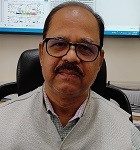
Name of the Speaker: Dr. Atul Kumar Sahai Title of the Seminar: Skilful sub-seasonal meteorological forecasting for efficient hydrological modelling Date and Time: 24 March 2021 (Wednesday), 4:00pm Online Platform: MS Teams [link to the video of the seminar] About the Speaker: Dr. Atul Kumar Sahai has obtained his Masters and Ph D degree in Mathematics from the University of Allahabad. He is Scientist G and the Project Director of Monsoon Mission at Indian Institute of Tropical Meteorology (IITM) Pune, and is leading the group of Extended Range Prediction. Dr. Sahai has expertise in climate variability and prediction, climate modeling, tropical convection, monsoon dynamics, extreme weather, MJO, role of remote teleconnections from ENSO and IOD, climate change and regional climate scenario generation for impact assessment studies based on regional climate models, operational climate services, flood/drought, cyclones and extreme precipitation prediction, heat and cold wave prediction, high-performance computing, and utilization of Artificial Intelligence and Machine Learning in the field of climate science. His most notable research led to the development of a dynamical ensemble prediction system for predicting the intra-seasonal oscillations of the Indian summer monsoon season. Due to the remarkable skill of this system, it has been awarded the ISO 9001:2008 standard certification in the year 2016 and it has been operationalised in India Meteorological Department. Since then, it is being used for real time forecasting of the onset, active/break spells and withdrawal phases of the Indian summer monsoon, heavy rainfall events, cold waves, heatwaves, Monsoon Intraseasonal Oscillations, Madden-Julian Oscillation, cyclogenesis, and fluctuations in summer/winter monsoon. Dr. Sahai has also formulated several strategies for the application of these extended range forecasts in agriculture, hydrology, health, and disaster management. He was given additional charge as Head, Climate Abstract: Dynamical extended range prediction provides an outlook of meteorological parameters up to 2-3 weeks in advance. The extended range prediction group at IITM has developed an Such predictions in rainfall and other surface meteorological variables can also be used as an input to hydrological models to predict impending floods and inundations along river basins. Long lead-time predictions provide sufficient time for the decision-making process for the stakeholders. River basin rainfall forecast over the Indian region during the monsoon season in the extended range thus has several useful applications in the hydrometeorological forecast domain. In this talk it will be discussed that how the extended-range forecast is generated and how it can be used for efficient hydrological modelling to improve the flood forecast, dam management etc.
|
|
25 Feb
2021
|

Name of the Speaker: Dr. Aavudai Anandhi Title of the Seminar: Review and Analysis of Food-Energy-Water Nexus Studies: Conceptual models Date and Time: 25 February 2021 (Thursday), 6:00pm Online Platform: MS Teams [link to the video of the seminar] About the Speaker: Aavudai Anandhi, Ph.D., is an Assistant Professor, Biological Systems Engineering, College of Agriculture and Food Science, Florida A&M University. She obtained her Ph.D from IISc, civil engineering department in 2008. In Dr. Anandhi’s group, during research, teaching, and outreach, they often use this concept: “There are known knowns, known unknowns, and unknown unknowns”. This aids in the application of computational intelligence for modeling ecosystem processes and their interactions at the food-water-energy (FEW) nexus while improving these predictions to environmental changes (climate, water-use and land-use) using complex systems engineering. They continue to develop novel solutions to engineering design and decision methodology for synergizing FEW systems for efficient, productive, and sustainable ecosystem management. For this they use a mixture of systems thinking approaches, conceptual and structural models, artificial intelligence, spatial statistics, and machine learning for analysis of the ecosystem services by exploiting new data streams to advance the system adaptation, resilience, and stress mitigation. Dr. Anandhi has authored 55+ research and teaching articles and obtained ~$12 Million funding. Her awards and recognitions include: “Emerging Researcher Award” at Florida A&M University; “Teacher of the year” award from Florida section of ASABE, ASCE’s ExCEEd fellow and “Blue Ribbon award” for innovative educational materials from ASABE. Dr. Anandhi’s work experiences and collaborations with software industry, state, federal and non-governmental agencies, as well in academic institutions in India, NY, KS and FL has provided the skills, experiences and knowledge to develop a successful program. Abstract: This talk presents a review and analysis of the current state of research and practice in the Food- Energy-Water (FEW) nexus. It is intended to provide scientists and practitioners in the FEW domains the tools, data, knowledge, and successful applications in this research and practice area. The talk also describes knowledge gaps in the FEW nexus domains. The objectives of this talk are (a) to synthesize existing knowledge in defining and conceptualizing FEW nexus for the stakeholders and help guide them in defining and conceptualizing their own FEW nexus, (b) to identify limitations and knowledge gaps. The following questions assisted in addressing the objectives: Which systems are involved? Where is the nexus applied or intended to be applied and at what scale? How are the nexus elements assessed? and Who should be considered? The study provides narrow and broad definitions as well as simple and complex conceptualization frameworks of FEW nexus that stakeholders can use while being aware of the limitations and knowledge gaps. |
|
28 Jan
2021
|
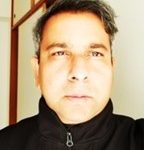
Name of the Speaker: Prof. Ramesh Teegavarapu Title of the Seminar: Towards Robust Hydrologic Modeling and Design: Utility and Validity of Quantitative Precipitation Estimates Date and Time: 28 January 2021 (Thursday), 6:00pm Online Platform: MS Teams [link to the video of the seminar] About the Speaker: Ramesh Teegavarapu, Ph.D. (Dr. T.) is a professor and graduate program director in the civil, environmental, and geomatics engineering department, at Florida Atlantic University, USA. He is also director of Hydrosystems Research Laboratory (HRL) in the department. He Is a Fulbright Scholar and Specialist and recipient of two research scholar and three excellence and innovation in teaching awards at FAU, a finalist for Distinguished teacher of the year award at FAU, and several national and international awards. He serves on the editorial board of multiple international peer-reviewed journals. His current research interests are climate variability and change, hydrometeorology, spatial precipitation analysis, hydroanalytics, water, and environmental systems modeling. Dr. T. has published over 125 technical articles in high-impact journals and conference proceedings and authored over 30 book chapters and is an author, co-editor, sole-editor of seven books from multiple reputed international publishers. He serves on multiple national and international technical committees related to water and climate change and held visiting professor appointments in Italy and Japan. Dr. T. has presented over 130 research talks including several invited and session keynote lectures in eighteen countries. He has organized, chaired, convened, and moderated over 80 technical sessions at national and international conferences and served on advisory committees of conferences and as general and technical co-chair of two international conferences. Dr. T. has designed and developed several innovative simulation and modeling environments/tools for understanding hydrological processes, hydrometeorological observations, climate change, and variability. Abstract: Accurate measurements of precipitation that characterize its spatial and temporal variability in a region are quintessential for the success of hydrologic modeling and design. Point measurements (i.e., rain gage observations) often plagued with systematic and random errors while lacking spatial coverage are questionable inputs to hydrologic design procedures and inadequate for distributed hydrologic modeling applications. Multi-sensor source-based quantitative precipitation estimates (QPEs) developed as gridded datasets/products are increasingly being used by hydrological modeling and design communities. This talk will focus on QPEs developed using weather-surveillance radar (WSR) using rain gage information as ground truth and will address issues related to the generation of radar-based precipitation estimates, Improvements in QPEs, bias analysis, and correction methods. The utility and validity of these QPEs for hydrologic modeling, design, and hydrosystems disaster management will be discussed.
|
|
22 Dec
2020
|

Name of the Speaker: Prof. Wouter Buytaert Title of the Seminar: Citizen science and participatory monitoring of water resources Date and Time: 22nd December 2020 (Tuesday), 4:00 PM Online Platform: MS Teams [link to the video of the seminar] About the Speaker: Wouter Buytaert is a Professor in Hydrology and Water Resources at Imperial College London (UK). His main research interests sit at the interface between hydrological process understanding, water resources management, and sustainable development. He has two decades of research experience in the Andes, where he co-founded a regional initiative for the participatory monitoring of Andean ecosystems, which is active in Bolivia, Peru, Ecuador, and Colombia. He also works extensively in India, Nepal, and Africa, leading projects on climate change impacts, floods resilience, surface and subsurface monitoring, and the link between hydrological extremes and human health. Wouter obtained a PhD in Environmental Engineering at the University of Leuven, Belgium in 2004 and joined Imperial in 2009 after holding research positions at Lancaster University and the University of Bristol. Abstract: All over the world, water resources systems face unprecedented challenges from overexploitation, degradation, and changing climatic boundary conditions. This poses a major challenge to their sustainable management, which is often aggravated by a scarcity of scientific evidence to support decision making. Despite the advent of remotely sensed data sources such as satellite imagery, quantifying the nature and scale of hydrological processes still relies strongly on in situ observations, which are often time and labour intensive. For example, many of the worlds rivers and other water bodies are still poorly gauged, while hydrometric monitoring networks are in decline in many places. This makes it opportune to explore new arrangements to support and improve hydrological data collection and evidence generation. One such arrangement is citizen science, which refers to the participation of the general public in the scientific discovery process. Although citizen science in itself is not a new phenomenon, the advent of new technologies for hydrological sensing, data processing, and communication opens new perspectives for its application in a water resources context. Moreover, citizen science may provide an opportunity to make the evidence creation process more collaborative, transparent and inclusive. However, implementing sustainable citizen science projects faces many challenges, ranging from the deployment of adequate and robust technologies, to ensuring the generation of long lasting benefits for all the involved actors. Here I draw upon experiences from South America, Africa, and South Asia to discuss some of the challenges and potential solutions of implementing citizen science and other types of participatory monitoring in a water resources context. I synthesise these findings by outlining an analytic framework that may help in the design and implementation of citizen science for natural resources management. |
